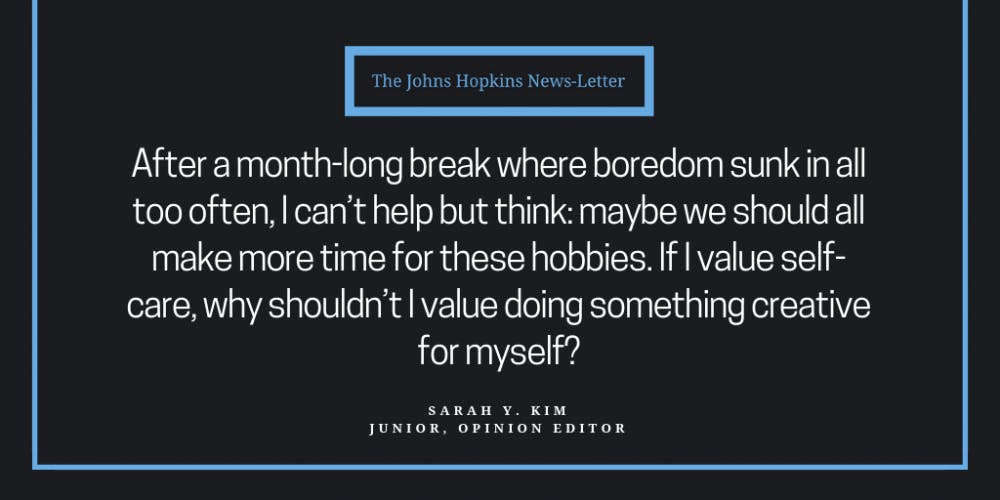“Ever to confess that you are bored means you have no inner resources.” This is a line in John Berryman’s “Dream Song 14” that I kept scrawling on pieces of scrap paper this past winter. My dad had once told me almost the exact same thing when I was seven, sitting in the back of the car and whining about how bored I was. Since then, I can’t remember a time I admitted to him that I was bored.
I would now like to finally confess that over the past year or so, I have often been “heavy bored.” Being busy helps and meeting friends helps. But more and more often now, when I’m alone and have leisure time, I become helpless.
For me, that wasn’t always the case. As an only child, I’d gotten through much of my life entertaining myself, even throughout high school. I wrote long-winding journal entries and dramatic, outlandish stories and created fantasy worlds with generations of fictional families. I filled page after page with ridiculously detailed drawings. I toyed around with my violin (now in a dusty corner of my house) and I found joy in every film I saw, in every book, even reenacting scenes from them in my bedroom. Imagination helped. Keeping adulthood at bay helped.
Now, as I slowly inch my way to the real world, preoccupied with school and “adulting,” I can’t enjoy my hobbies the way I used to. In particular, I feel guilty when I do creative writing outside of class. It’s time-consuming and self-absorbed work. I’d think: shouldn’t I be doing something that matters? Isn’t this selfish? What’s the point? Even reading or watching fiction feels self-indulgent at times.
There’s some sadness in no longer engaging in old hobbies. But there’s also fear. I fear prolonged boredom because it forces me to examine myself and ask difficult questions. Without distractions — friends, school, extracurriculars — self-doubt has time to set in. Why am I bored? Is it because I’m boring? What do I really want to do with my life? Am I making the most of my time and potential right now? Why am I not taking more risks? Am I just afraid of everything? Why can’t I do better?
At Hopkins, we tend to define ourselves by nothing more than what we can achieve. Once we’re not achieving, we might not know what to make of ourselves or do with our time. Too many people around me experience burnout that when they get the time to rest, they do not have energy for creative hobbies anymore.
But after a month-long break where boredom sunk in all too often, I can’t help but think: maybe we should all make more time for these hobbies. If I value self-care, why shouldn’t I value doing something creative for myself?
In the end, I like to think that my newfound boredom is also a part of growth — that it’s setting me on the path to finding new challenges, to finding purpose. Being bored means I look outward more. I can be less selfish and more present. I am likelier than ever to be heavy bored, but unlike Berryman, I do not conclude that this means that I have no “inner resources.” I mean to put my boredom to use: to create, to take risks, to take control of my life.
Sarah Y. Kim is a junior double-majoring in Writing Seminars and International Studies from Walnut Creek, Calif. She is the Opinions Editor.





